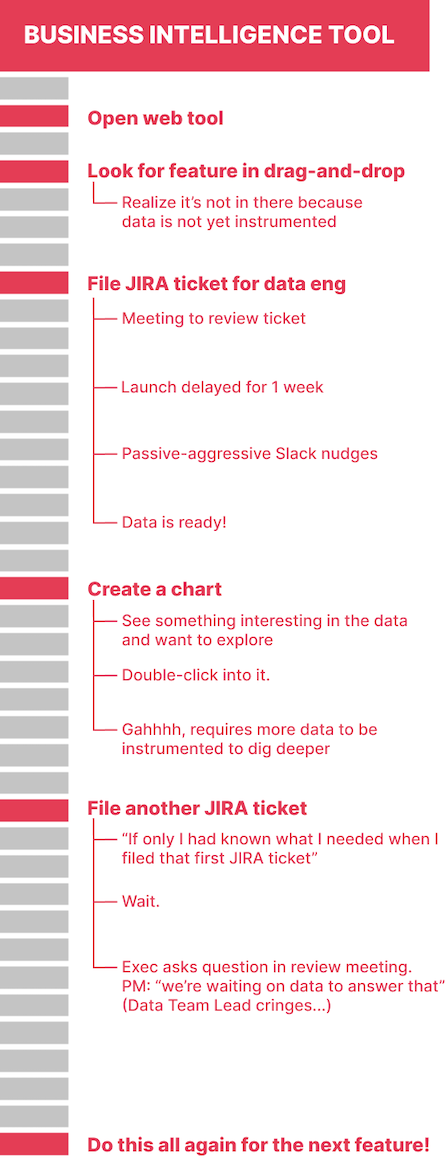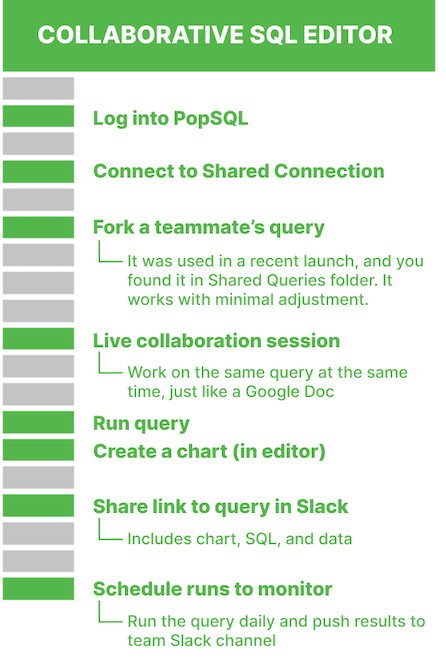Why data collaboration is broken
What’s standing in the way of data collaboration
Data collaboration has been broken from the beginning 💔 It started with legacy SQL tools and continued with business intelligence (BI) tools.
How legacy SQL tools block data collaboration
Legacy SQL tools have two foundational flaws: They trap your team in silos and they fragment workflows across numerous tools.
Siloed teams
Difficult setup: Every user of a legacy SQL editor must first hunt down and manually re-enter database credentials. These credentials are the keys to the kingdom, and they must be securely distributed (a challenge in its own right). Often, less technical users struggle to complete this step or are denied permission outright.
Wasteful query rewriting: Imagine if every email from a marketing, sales, or support team had to be written from scratch. How much time would be wasted? With legacy SQL editors, that's the status quo. The perfect query may be sitting in a teammate's editor, but instead it’s being rewritten for the umpteenth time.
Costly query rerunning: It's a common joke: When you start running your query, it’s time to go get a coffee ☕️ Once the query completes, you need to share the results with a teammate. The choices? Either send a 2GB CSV via email or Slack a SQL snippet to your teammate so they can rerun it (and go get their coffee, too). And if the query runs against a cloud data warehouse? You've just paid twice for the same insight.
Fragmented workflows
Lost data knowledge: Many poor souls have started a data dictionary in a spreadsheet then struggled to maintain it. The market is flooded with data dictionary products, but they don't integrate with legacy SQL editors. Wouldn't it be nice to see which tables and columns your teammates use most often in their queries in your editor? Or be able to define your tables and columns, tag them, and have these show up in autocomplete as you’re writing your query?
Painful data visualization: It's hard to spot trends in raw data outputs. Legacy SQL editors don’t have in-app charting, so you have to export data to spreadsheets just to build a basic visual. This wastes time and breaks the linkage between the data source and the visualization. And since visualizing results during exploratory analysis is an iterative process that requires frequent edits, many analysts don’t even bother with the tedious copying, pasting, and reformatting of data in Excel or Sheets, which means they’re missing out on finding correlations, trends, and other valuable insights.
Troublesome query sharing: As mentioned above, sharing a query involves email, Slack, Zoom calls, and coffee breaks. But the recipient must also know which database or warehouse to run a query on, have the right credentials, and trust that they’re always running the latest version of that query. This is tricky to do when your team’s SQL isn’t centrally stored, version-controlled, and discoverable by others.
Challenging definition standardization: In most teams, the question of, "How do we define an active user?" is answered a dozen different ways. With legacy SQL editors, standardization requires manual upkeep in additional tools.
See the pain of legacy SQL tools
The pain points of legacy SQL tools snowball. Let's look at the common example of a new feature launch.

How business intelligence tools block data collaboration
Weren’t BI tools supposed to fix all this? They've tried, but they've swung way too far in the other direction.
Stubborn system architecture: In an attempt to standardize, BI tools are extremely rigid in what data can be explored and how. Now data analysts spend more time instrumenting data than analyzing it ⏱️ If a business stakeholder wants a dashboard, they may have to wait several weeks for an analyst to instrument the data and will likely have several back-and-forths before the dashboard is complete.
Dashboard-centric design: The point of BI tools is data visualization, so they’re overly focused on solving the needs of business users rather than data teams. They push data teams into dashboard-focused workflows even when the goal may be to rapidly explore data sets, prototype, and run ad hoc reports. And because their native SQL editors aren’t their core competency, SQL development workflows are severely limited in BI tools.
Technical dependency: BI tools have abstracted away SQL to give access to all users. As a result, they create endless dependency on analysts and limit what business questions can be answered.
See the pain of BI tools
Let’s look at another feature launch, this time with the repetitive work of legacy SQL tools replaced by the tedious delays of BI tools.

There’s a better way
A collaborative SQL editor fixes the foundational flaws of legacy SQL tools without going overboard like BI tools.
There are no silos in a collaborative SQL editor. New members of your team are greeted with a shared connection, not a quest for credentials. Teams organize their queries into shared folders, allowing them to reduce, reuse, and recycle existing queries ♻️ And instead of time wasted on reruns, teams can securely share results.
A collaborative SQL editor is not fragmented, but holistic. Need to find data quickly? Learn from teammates’ queries. Need to visualize? Find all the charts you need without ever obscuring the source. Stop toggling between queries and results with a scrolling, iterative user interface and explore your schema just as easily. You can automate query runs and push your data where your team will see it: Slack.
And data exploration remains blissfully unbounded, not rigid and report-centric. Not every question can be answered by a dashboard (although collaborative SQL editors have dashboards, too). There’s no data instrumentation, yet less technical users can still pull reports thanks to query variables.
See the ease of a collaborative SQL editor
Let’s take a look at a feature launch one last time. But this time, see how simple it can be with the right tool.

It's so easy, we even wrote a template for feature launches.
How to achieve data collaboration
Data collaboration doesn't have to be broken ❤️🩹 Learn how you can help your team with a collaborative SQL editor.
